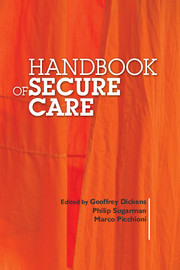Book contents
- Frontmatter
- Contents
- List of tables, boxes and figures
- List of contributors
- Preface
- 1 The evolution of secure and forensic mental healthcare
- 2 Mental disorder and offending
- 3 Clinical risk assessment in secure care
- 4 Risk management in secure care
- 5 Recovery in secure environments
- 6 Personality disorder
- 7 Women's mental health, aggression and offending
- 8 Offenders with intellectual disability in secure services and the criminal justice system
- 9 Secure mental healthcare for young people
- 10 Secure care for people with autism spectrum disorder
- 11 Acquired brain injury, trauma and aggression
- 12 Managing aggression and violence in older people
- 13 Firesetting in secure settings: theory, treatment and management
- 14 Specialist psychological treatment programmes in secure mental healthcare
- 15 Nursing in secure mental healthcare settings
- 16 Prescribing for specialist populations
- 17 Human rights in secure psychiatric care
- 18 Quality assurance and clinical audit in secure psychiatric care
- 19 Psychological support following violent assault and trauma: what works for staff in secure settings?
- Index
1 - The evolution of secure and forensic mental healthcare
Published online by Cambridge University Press: 02 January 2018
- Frontmatter
- Contents
- List of tables, boxes and figures
- List of contributors
- Preface
- 1 The evolution of secure and forensic mental healthcare
- 2 Mental disorder and offending
- 3 Clinical risk assessment in secure care
- 4 Risk management in secure care
- 5 Recovery in secure environments
- 6 Personality disorder
- 7 Women's mental health, aggression and offending
- 8 Offenders with intellectual disability in secure services and the criminal justice system
- 9 Secure mental healthcare for young people
- 10 Secure care for people with autism spectrum disorder
- 11 Acquired brain injury, trauma and aggression
- 12 Managing aggression and violence in older people
- 13 Firesetting in secure settings: theory, treatment and management
- 14 Specialist psychological treatment programmes in secure mental healthcare
- 15 Nursing in secure mental healthcare settings
- 16 Prescribing for specialist populations
- 17 Human rights in secure psychiatric care
- 18 Quality assurance and clinical audit in secure psychiatric care
- 19 Psychological support following violent assault and trauma: what works for staff in secure settings?
- Index
Summary
Introduction and aims
It is in all likelihood a by-product of human evolution, and of the complexity of the human brain and of society, that there have always been dysfunctional individuals who present overtly with a mental or behavioural disorder. They may cause significant harm and disruption to others, as well as to themselves. The most seriously affected depend on the concerted efforts of those around them to provide a safe and supportive environment, or risk neglect, rejection, homelessness and even persecution. Perhaps there always will be such problems in our communities, and thus a continuing need for secure mental health services, at least until science and society have advanced greatly from their present position.
Mentally disordered offenders and others presenting serious challenging behaviour are more often successfully categorised and labelled by local juridical and medical practice, and subject to other processes of social stigmatisation, than they are helped towards recovery. In many instances temporary or indefinite containment is achieved, which may serve to protect the public, but alone this acts as a poor substitute for well-being and social recovery. Those with knowledge of social exclusion and those who work closely with this group will grasp both the immense long-term cost of this failure to society, in terms of morbidity and mortality, crime, social dependency and family breakdown, and the strategic value of early and late intervention. Governments, however, need to be persuaded that the investment involved will reap longer-term benefits (Sugarman, 2012).
It is important to appreciate how the very human need for secure containment of disturbed individuals transcends boundaries of time and place, of gender, age and developmental stage, and of diagnostic and criminal justice status. Very similar challenges of care, control and rehabilitation are seen in different cultures and in different groups. While the international psychiatric community is moving on with active information-sharing on areas such as service models (Maj, 2008), a fundamental debate is just beginning about how societies around the world can best catalyse effective mental health service development (Sugarman & Kakabadse, 2011). We believe that local diversification in provision accelerates improvement in secure and forensic care, focused on service user need rather than organisational goals, with hospitals centred on the care and recovery of the most challenging and needy individuals, and on the promotion of excellence through teaching and research.
- Type
- Chapter
- Information
- Handbook of Secure Care , pp. 1 - 14Publisher: Royal College of PsychiatristsPrint publication year: 2015

